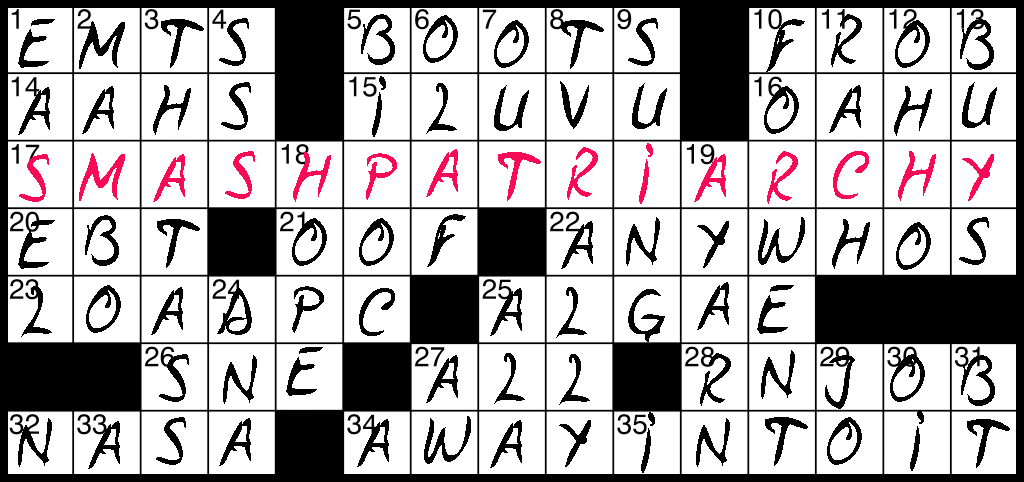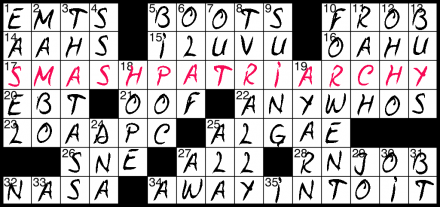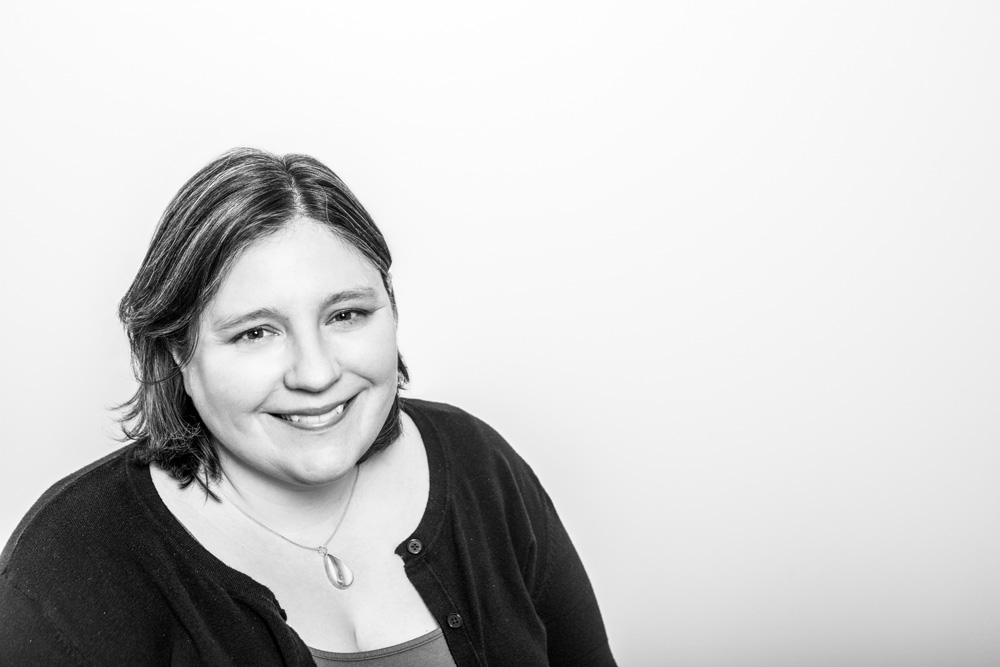Abortion rights, women of color, and LGBTQI+ people are under attack. Pledge to join us in fighting for gender justice.
We Should Smash the Crossword Patriarchy

 Right before this whole massive pandemic/global crisis started, I’d become the latest subscriber to The New York Times’ addictive Spelling Bee online game, which is basically a fancier version of the word-unscrambling apps that your 10-year-old cousin and great–aunt seem to play all the time. I’d seen enough people I admire on Twitter post about Spelling Bee and its charms, and like everyone who spends too much time online, I was influenced into downloading it. With an annual (paid) subscription to Spelling Bee, you also get access to The New York Times’ daily crossword in handy app form. I didn’t need another thing to do on my phone. Not even a little bit. But after a long hiatus from doing crosswords, I was hooked—again.
Right before this whole massive pandemic/global crisis started, I’d become the latest subscriber to The New York Times’ addictive Spelling Bee online game, which is basically a fancier version of the word-unscrambling apps that your 10-year-old cousin and great–aunt seem to play all the time. I’d seen enough people I admire on Twitter post about Spelling Bee and its charms, and like everyone who spends too much time online, I was influenced into downloading it. With an annual (paid) subscription to Spelling Bee, you also get access to The New York Times’ daily crossword in handy app form. I didn’t need another thing to do on my phone. Not even a little bit. But after a long hiatus from doing crosswords, I was hooked—again.
Crossword puzzles seem to have their own language, or at least their own use of language. Words and names that would never come out of our mouths in our everyday lives show up regularly, like the people we used to run into at the grocery store on Saturday mornings before the pandemic. ALEE. OLE. ISAU AOKI (the golfer). ERMA (Bombeck). I relearned “crosswordese” within a few weeks of getting readdicted to puzzles.
We accept these words and names, showing up in puzzle after puzzle, because the constructors get backed into literal corners when they’re writing—and who are we to begrudge them the well-worn path out? But what’s become obvious to me now that I’ve got a 80-day completed puzzle streak going is that of course constructors—and crossword editors—are also using their preferred language, cultural references, and perspectives to write their clues and answers.
And who do you think is primarily constructing and editing crossword puzzles at The New York Times these days? Men mostly. White men, mostly, of course.
The center of the New York Times crossword online fandom is Rex Parker Does the NYT Crossword, a daily review of the puzzle, written by Michael Sharp. In April, Sharp shared on his site a link to an open letter to The New York Times about the lack of diversity that is reflected in the Times’ puzzles. The letter, written and signed onto by hundreds of constructors, current and former Times’ staff, and solvers, made three demands: that women and/or non-binary puzzle lovers comprise at least half of the test solving team, that constructors receive access to proofs before their puzzles go to print, and that the Times make a public commitment to adding diversity to its editorial staff. The letter came after Natan Last discussed “The Hidden Bigotry of Crossword Puzzles” in The Atlantic and after Claire Muscat, a test solver, resigned her position because she described being hired to provide a token “female” perspective as she tested while at the same time her feedback on puzzles was minimized.
Reading the letter was equal parts thrilling and depressing as a reborn crossword solver. I’d noticed tons of cringe-worthy clues as I went about solving each day, but I’d just shrugged and chalked it up to the general fusty reputation of the puzzles (I recognize the privilege in that impulse to shrug too). But of course, it doesn’t have to be that way. And in the letter, I found that I wasn’t alone in my hope that the genre can continue to evolve.
How do we make crosswords more inclusive? By hiring more women and people of color, of course. In 2018, about 15 percent of the Times published crosswords were written by women. This year, the New York Times crossword section celebrated Women’s History Month in March—by having a mere week of puzzles constructed by women. And the open letter and Last’s article in The Atlantic also laid bare how editorial bias narrows what makes it into the puzzles: “MARIE KONDO, BELL HOOKS, and FLAVOR FLAV are all examples of entries that have been deemed too ‘niche’ for mainstream puzzles.” Sigh.
Language is a beautiful reflection of our changing culture and society, for good and for bad. But if the gatekeepers at the Times (primarily in the form of its main editor, Will Shortz) continue to tightly control what appears in the Times’ puzzles, they’ll never do more than reflect their own limited perspectives of the world.
Still, I think we can smash the Crossword patriarchy soon. I’m happy to join the ranks of those seeking out puzzles constructed and edited by women and people of color and demanding more from those in power in CrossWorld. And if I find myself needing yet another new diversion to get through the pandemic, maybe one day I’ll end up becoming a woman who constructs crosswords too.


